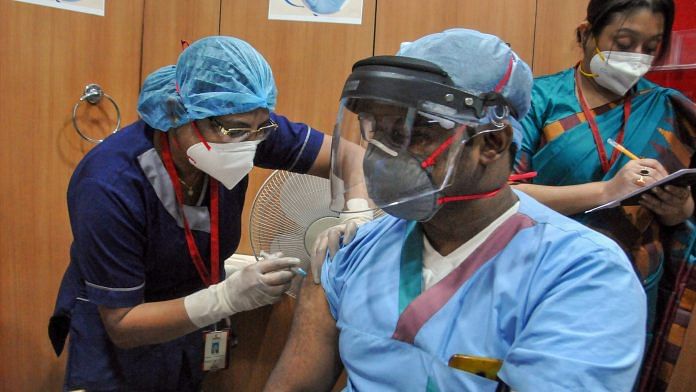New Delhi: By mid-December 2020, about 21.4 per cent or 28 crore Indians had been infected by the SARS-CoV2, the results of the Indian Council of Medical Research’s third serological survey show.
The seroprevalence among 10-18-year-olds was found to be 25.3 per cent. The survey by ICMR was conducted between 17 December and 8 January.

Antibodies that are assayed during a sero survey take about two weeks to form, which means this reflects the state of the country in early to mid-December, NITI Ayog member (health) Dr V.K. Paul said Thursday at the press meet.
On 15 December, India had 99,32,547 cases. This means there were an estimated 27 crore crore undetected Covid infections in the country by that time.
While the survey was carried out in the same 700 villages in 70 districts across 21 states where the first and second rounds of the survey in April and August, respectively, were done, the results were statistically extrapolated to reflect the whole country.
“Delhi was not a part of the survey… we have made statistical extrapolations so we can say that 21.4% of Indians were seropositive,” ICMR director general Balram Bhargava said at the meet.
These numbers also mean that India’s infection fatality rate (including undetected cases) was 0.05 per cent by December against the national case fatality rate of 1.45 per cent.
Also read: Serum Institute, UNICEF sign pact for supply of 1.1 billion doses of AstraZeneca, Novavax
Survey details
The survey covered 28,589 people aged over 10, and 7,171 healthcare workers, with about 100 of the latter being covered in each district.
The prevalence in urban slums was found to be the highest at 31.7 per cent, followed by 26.2 per cent in other urban areas and 19 per cent in rural areas. Around 22.7 per cent women, 20.3 per cent men and 25.3 per cent children were found to have antibodies against the SARS-CoV2 virus.
A sero survey looks at the presence of antibodies against a particular pathogen to gauge whether individuals have been exposed to it or not. Overall seropositivity in healthcare workers was found to be 25.7 per cent.
“There are a lot of positives… while this means that the infection has travelled deep in densely populated cities, about 75 per cent of the population is still not affected. This means that we cannot stop Covid appropriate behaviour, masks, hand washing etc,” Paul said.
The August sero survey had found the prevalence rate in adults was 7.1 per cent, which meant India by then had 9-11 crore infections. The April sero survey, which covered only adults, had shown a 0.73 per cent prevalence of infection coming to a total of 64 lakh infections in early May.
Also read: Monoclonal antibody treatment, given to Trump, fails against Covid variants — Guardian report
By Friday, 50% healthcare workers to be vaccinated
Officials including Health Secretary Rajesh Bhushan expressed satisfaction at the way vaccinations have progressed.
By 1.30 pm Thursday, as many as 45,93,427 people had been vaccinated. Madhya Pradesh has completed first dose of vaccinations for 73.6 per cent of its healthcare workers, followed by Rajasthan at 66.8 per cent and Tripura at 65.5 per cent.
Among the big states, however, Tamil Nadu and Assam continue to lag in vaccinations with the former having managed to cover only 23.70 per cent healthcare workers and the latter just 20.20 per cent. Eleven states have covered less than 30 per cent of its targeted population while 13 have covered more than 50 per cent.
“We have been doing well and I can confidently say that by tomorrow 50 per cent of our healthcare workers would have been covered. This means our health services can go ahead without any fear… This also shows that we have made great strides in ensuring acceptability of Made in India vaccines and have tackled hesitancy very well,” said Paul.
He also assured that not a single dose of vaccines would be wasted because of expiry or other issues.
Vaccinations feedback positive
Bhushan said vaccinations are currently going on in 5,912 public and 1,239 private facilities, adding that feedback had been received from vaccine beneficiaries through the Co-WIN system.
Data received from 5,12,128 respondents showed 97.41 per cent said there was adequate social distancing at the booths, 98.43 per cent had been informed about the process, 97.13 per cent had been asked to wait for 30 minutes after vaccination and 97.38 per cent were satisfied with the experience.
However, 11.05 per cent said they had not been informed about adverse events following immunisation (AEFIs).
Bhushan said India has a “structured and robust” system of AEFI reporting and management. So far, 8,563 AEFIs have been reported which comes to 0.18 per cent of vaccinated individuals, 34 people have needed hospitalisation (that comes to 0.0007 per cent) and there have been 19 deaths post vaccination, none of which have been causally related to the shot.
Also read: Lack of access to contraceptives, rise in domestic work — how Covid, lockdown affected women



